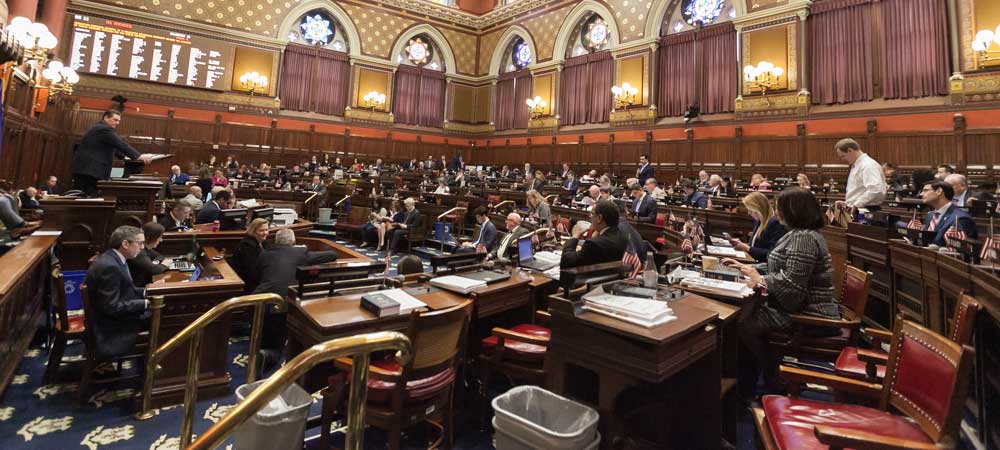- The legal sports betting market in Connecticut could bring in as much as $50 million in annual revenue.
- This latest bill, CT H 5168 gives access to operators other than the Tribal casinos.
- Both sports betting bills, CT H 5168 and CT SB 21 will be heard together at a Public Hearing set for March 3.
HARTFORD, Conn. – A new bill that would legalize sports betting in Connecticut, CT H 5168 went before the Joint Public Safety and Security Committee on Tuesday.
The bill’s sponsor, Representative Joe Verrengia (D- West Hartford) is also the co-chairman for this committee which is why they were given the soft introduction to what CT H 5168 entails.
There are other sports betting bills out there currently gaining traction but Verrengia felt the need to draw up one of his own as he has strong opinions on the legalization of wagering on sporting events in the Nutmeg State.
The Latest Sports Betting Bill In Connecticut
Representative Joe Verrengia wanted a bill to legalize sports betting that would allow for more than Tribal businesses to apply. Bill CT H 5168 encompasses everything that was within Verrengia’s original vision for the Connecticut sports betting market.
Tribal casinos such as Foxwoods, Mohegan Sun, and a possible East Windsor casino will be able to run both retail and online sportsbooks. Along with these operators, the Connecticut Lottery and off-track betting sites will also be eligible to run their own land-based and internet sports betting businesses.
From the start, Verrengia wanted to include everyone as to create a competitive open market that would be more beneficial to the bettors of the state.
Retail sports betting lounges would have a 10% tax rate while internet platforms would have a rate of 14.75% on all revenue gained through sports bets. To be eligible for a license, operators cannot be affiliated in any way with the marijuana or cannabis market as is a stipulation within the bill.
An operating license for a sportsbook would cost $750,000 with an added application fee of $100,000. Renewal is required every five years for a fee of $850,000. The Connecticut Lottery does not need to pay these fees for licensure.
They would be given a maximum of four retail locations plus internet sportsbooks that they could use to offer sports betting to their lottery customers.
This bill, if passed, would not be able to become law without tribal-state compact amendments by Governor Ned Lamont for the purposes of gaming because of the inclusion of commercial operators.
The Other Bill On The Table
Bill CT SB 21 is a sports betting bill that needs no introduction in Connecticut since it’s been moving along through the committees.
This bill would make gambling on sports matchups exclusively offered by the Tribes. All wagering activity on sports would be done through the Tribes, including mobile platforms that would need to be done on Tribal land.
A full draft of the bill was requested to be drawn up so that it may be presented further. Governor Lamont has previously stated that he would like a broader range for the sports betting market rather than just giving the Tribes the monopoly on it.
Should both bills pass and move to his desk, he may be in favor of Verrengia’s version which offers more opportunities for all casino businesses in Connecticut.
What’s Next?
Both CT SB21 and CT H 5168 will be going head to head with their full drafts during a public hearing. The Joint Public Safety and Security Committee will hold the hearing on March 3. Each bill will receive time on the floor to be presented. Connecticut’s session ends on June 5, allowing lawmakers ample time to decide on the fate of legal sports betting in the Nutmeg State for 2020.
Advertising Disclosure
In order to provide you with the best independent sports betting news and content LegalSportsBetting.com may receive a commission from partners when you make a purchase through a link on our site.
News tags: Connecticut | Connecticut Lottery | CT H 5168 | CT SB 21 | Foxwoods | Joe Verrengia | Joint Public Safety and Security Committee | Mohegan Sun | Ned Lamont

Christina has been writing for as long as she can remember and does dedicated research on the newly regulated sports betting market. She comes from a family of sports lovers that engage in friendly bets from time to time. During the winter months, you can find Christina baking cookies and beating the entire staff at Mario Kart…the N64 version of course.


 Bitcoin Sports Betting Sites
Bitcoin Sports Betting Sites Best Online Sports Betting
Best Online Sports Betting Famous Sports Bettors
Famous Sports Bettors States With Legal Sports Betting
States With Legal Sports Betting Sports Betting Events
Sports Betting Events




